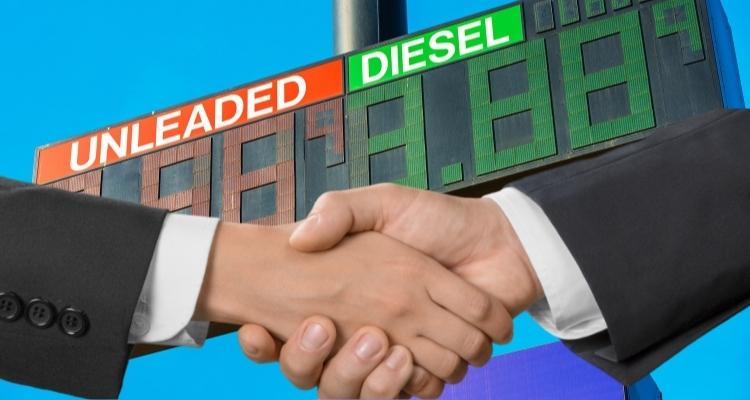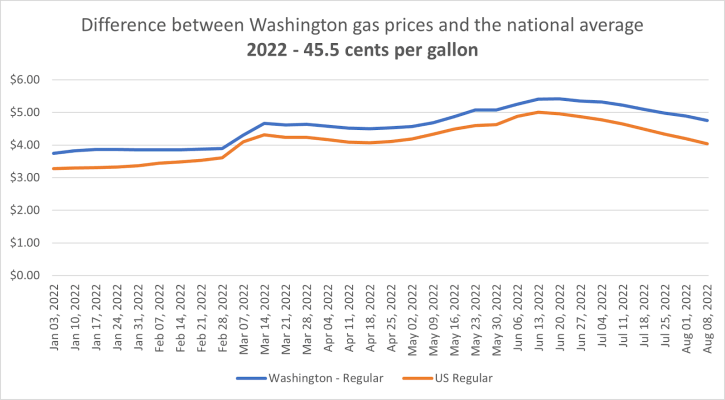
Todd Myers of the Washington Policy Center is willing to put his reputation and much more on the line
Todd Myers
Washington Policy Center
Based on the Department of Ecology’s projections, Washington state’s new tax on CO2 emissions will add about 46 cents to the cost of a gallon of gas next year. Governor Inslee disagrees. He says the impact will be “pennies.”

This calls for a bet.
Bets can provide a modicum of accountability for politicians and others who make claims that are, too often, based on politics rather than reality. Another way to put it is that bets are a tax on BS.
The Department of Ecology’s estimate for 2023 is that the cost of a permit to emit one metric ton of CO2 will be $58.31. For gasoline with a 10% ethanol blend, this amounts to an additional 46.6 cents per gallon.
The calculation is an estimate because, unlike a typical gas tax which sets a flat amount for the increase, the new law creates a market for a limited number of emissions permits. As demand for permits and companies’ ability to cut emissions efficiently fluctuates, so too will permit prices. That translates into a range of projections for how the CO2 law will translate into gas prices. Ecology’s projections are based on an independent analysis by Vivid Economics which modeled the projected market for next year and produced a price estimate.
The governor disputes those results. He says it will add only “pennies.” He told a reporter from Fox 13 that consumers “are not going to see much higher gas prices” due to the new taxes.
Let’s see who is right.
Since January, the average difference between Washington state gas prices and U.S. gas prices has been 45.5 cents per gallon, according to the U.S. Energy Information Administration. The difference can vary widely from week to week. The gap has been as low as 20 cents per gallon. Currently, Washington residents pay about 70 cents per gallon more than the average price in the U.S.

Given the fluctuation in the difference between Washington’s prices and the national average, and the uncertainty of implementation of the CO2 law, here is the bet we are offering.
- I predict that between January and the end of July 2023, the average price of Regular gasoline (All formulations) in Washington state will be an average of 70 cents per gallon higher than the national average. This is the current 45-cent per gallon gap plus an additional 25 cents per gallon from the new tax on CO2 emissions.
- If the average difference is above 70 cents per gallon, then I win. If it is less than 70 cents per gallon, I lose.
- I will bet $50 to charity. If I win, losers will make a donation to Plastic Bank, an organization that reduces the amount of plastic in the ocean.
- We will use data from the U.S. Energy Information Administration – https://www.eia.gov/petroleum/gasdiesel/
The governor has a history of making claims that are contradicted by his own agency or real-world experience. But if he believes his rhetoric, he should take me up on this bet. I am willing to test my prediction. Is he?
Others who believe the governor’s claim, including legislative sponsors of the bill, are welcome as well, although it is first-come-first-served, and I will probably cut off the number of bets after two or three.
Todd Myers is the director of the Center for the Environment at the Washington Policy Center.
Also read:
- Opinion: Revolution or revival?Nancy Churchill argues that Washington state is ground zero for a Marxist-style revolution but says a cultural revival is possible through personal responsibility and the America First movement.
- Letter: ‘It’s said sarcasm is the lowest form of wit’Amboy resident Thomas Schenk criticizes Olympia’s use of “emergency clauses” and other legislative tactics that limit public participation.
- Letter: ‘We’re going to give them some money and a plane ticket, and then we’re going to work with them’Camas resident Anna Miller supports a new structured self-deportation policy, calling it a balanced approach to immigration and economic needs.
- Opinion: What the 2025 legislature tells us about why Washington’s government keeps failingTodd Myers of the Washington Policy Center argues that Washington’s government fails because it resists humility, experimentation, and accountability in its policymaking.
- Letter: Vancouver needs broader leadership than just a teacher’s lensVancouver resident Peter Bracchi urges Mayor Anne McEnerny-Ogle not to seek another term, calling for more diverse and inclusive leadership rooted in broader experiences.










